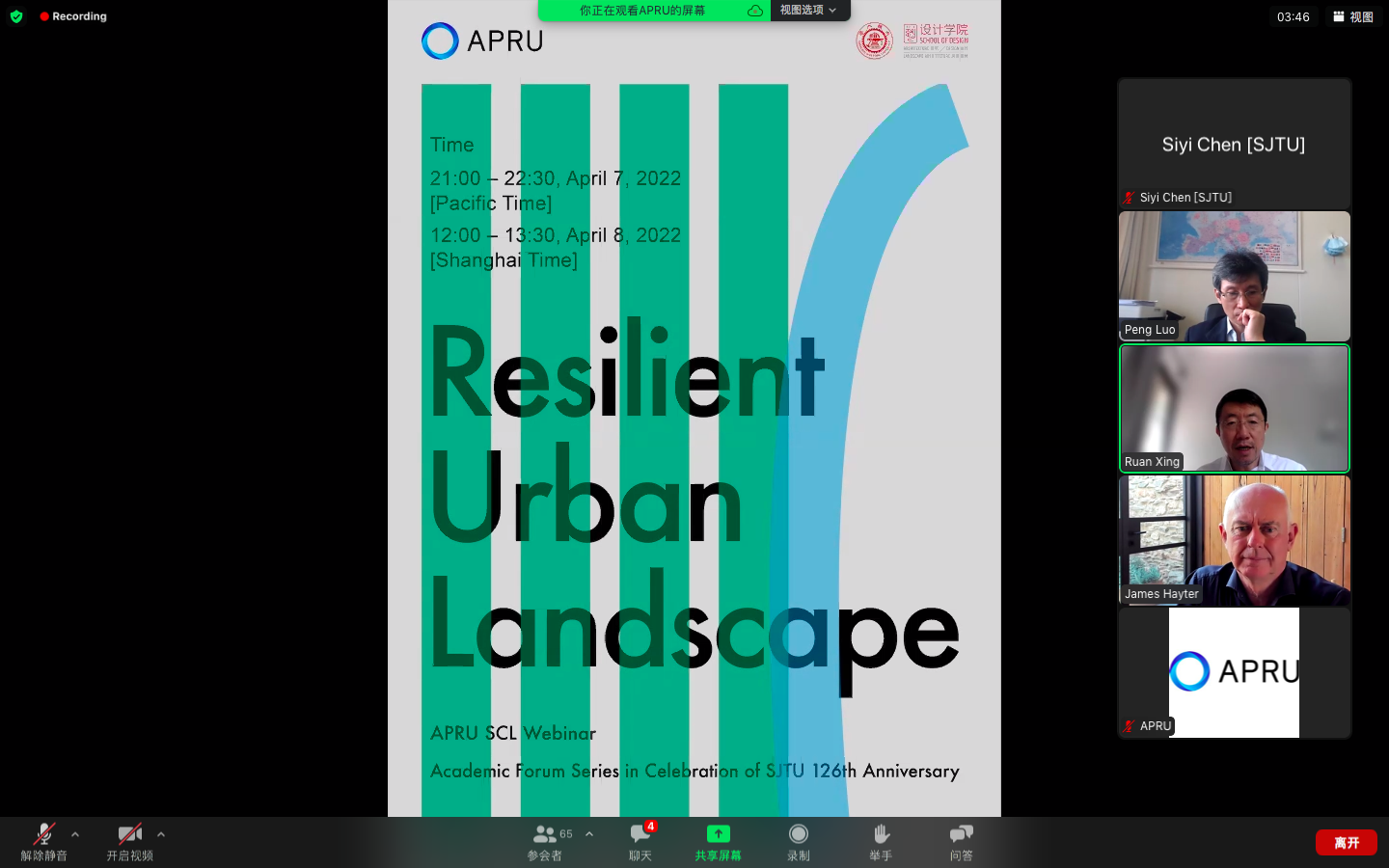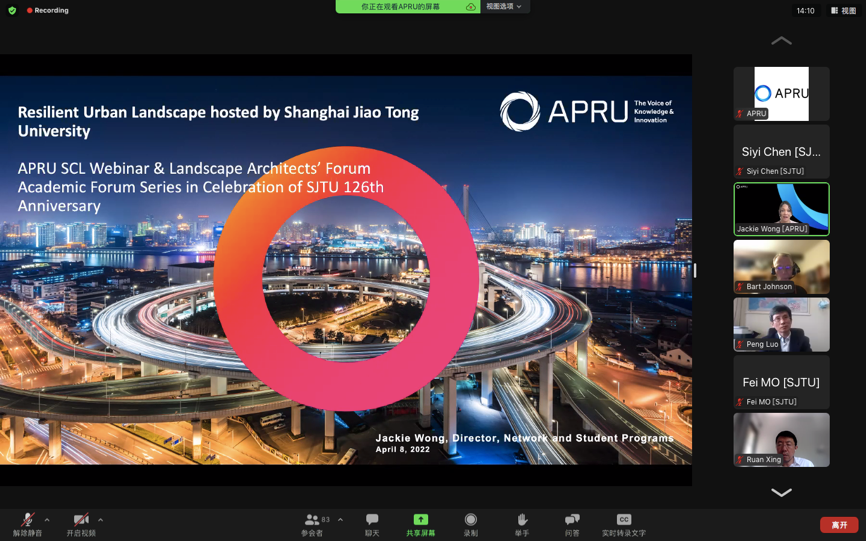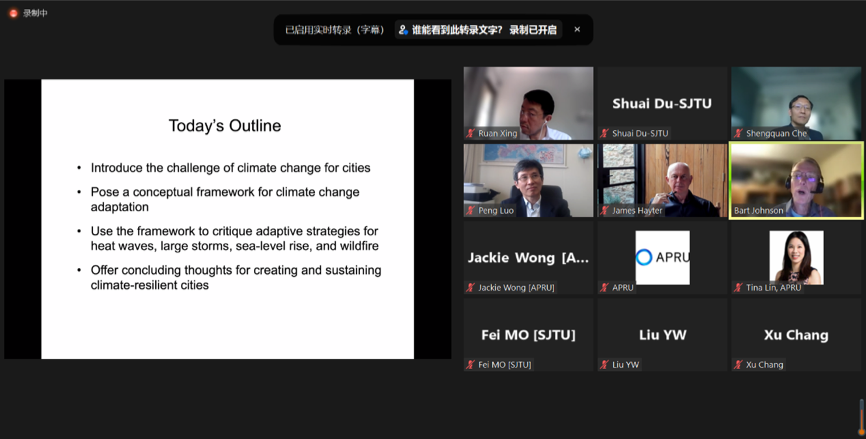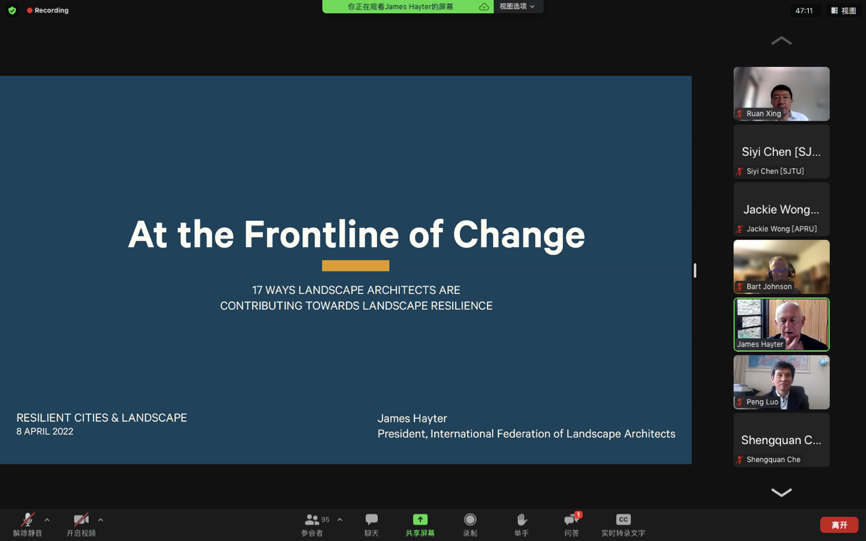Shanghai Jiao Tong University Successfully Held the "Resilient Urban Landscape – APRU SCL Webinar & Landscape Architects’Forum"

On April 8, 2022, the "Resilient Urban Landscape – APRU SCL Webinar & Landscape Architects’Forum" jointly organized by Shanghai Jiaotong University, the Alliance of Pacific Rim Universities (APRU), and the Shanghai Landscape Architecture Society was successfully held online. The event is held in celebration of the 126th anniversary of Shanghai Jiao Tong University, as well as a member of APRU. It is intended to align with universities, professional associations and practices to call for global attention to environmental issues such as climate change, biodiversity loss may bring significant influences on urban ecological civilization, and suggests to seek innovative solutions with international perspective and local characteristics through international cooperation and communication.
The webinar was broadcasted simultaneously on the School of Design official Bilibili account, attracting approximately thousand viewers during peak hours. The event was chaired by Ruan Xing, Dean of the School of Design, Shanghai Jiaotong University, Bart Johnson, Professor of the University of Oregon, James Hayter, the president of International Federation of Landscape Architects (IFLA), Professor of the University of Adelaide, and Che Shengquan, Professor and Deputy Dean of the School of Design, Shanghai Jiao Tong University delivered academic lectures with a Q&A session afterwards.
Luo Peng, Professor, Director of the International Affair Division of Shanghai Jiao Tong University, delieverd an opening speech. He mentioned that after Shanghai Jiaotong University officially joined the APRU in 2019, we participated in various international events and activities, as well as promoting students’ global engagement during covid and other scientific cooperations.

Jackie Agnello Wong, director of APRU network and student programs, introduced the background of APRU. It is composed of 61 outstanding academic institutions in the North America, Asia and the Asia-Pacific region. It has a history of nearly 25 years and aims to bring together experts from multiple backgrounds such as leaders, researchers, and policy makers to efficiently solve the problems faced by sustainable development in the 21st century. Her further expressed their heartfelt thanks to Shanghai Jiao Tong University for actively organizing this activity on the theme of resilient urban landscape.


Professor Bart Johnson focuses on “Creating and Maintaining Climate Resilient Cities", calling for active response to the climate crisis to predict future changes and take action before it occurs, explores various strategies to adapt cities to rapid climate change within the framework.With the title of "At the Frontline of Change - 17 Ways Landscape Architects are Contributing Towards Landscape Resilience", Professor James Hayter proposed 17 corresponding approaches to resilient landscape design, corresponding to the 17 goals of the United Nations Sustainable Development Goals, and encouraged everyone use the power of design to participate in the contribution of urban resilient landscape. Professor Che Shengquan introduced the framework of sponge city theory and practice through the cases Shanghai Jiao Tong University was involved. The current situation of urban stormwater management in China proposed a stormwater management plan and formed a technical system. At the same time, it was demonstrated and promoted in some cities in China.
At the end of the webinar, Zhu Xiangming, President of the Shanghai Landscape Architecture Society, delivered a concluding speech. He believes that many cities in China and the world are facing the challenge of how to deal with the various environmental problems mentioned in today's lectures. This seminar discussed how landscape architecture planning and design can deal with important issues such as climate change, sustainable development and ecological design, and called on professionals to work towards urban environmental issues, In the future, the society will also strengthen cooperation with universities, jointly promote the integration of production, education and research in design disciplines, provide more high-quality professional resources, and jointly contribute a more resilient and attractive global city of Shanghai.